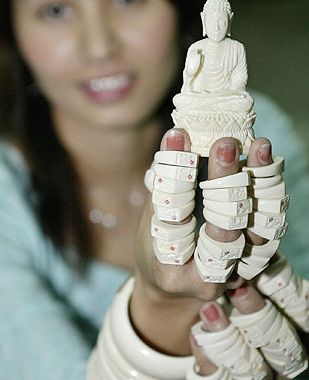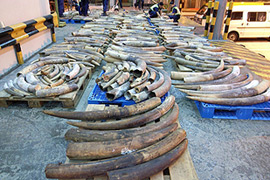Ivory seized in Thai customs bust
Customs seize two tonnes of elephant tusks from South Africa at airport warehouse.

No arrests have been made so far.
Ivory shipped to Thailand typically goes to carvers who fashion it into Buddhist statues, bangles and jewellery for sale to tourists or sale in other countries.
Biggest haul
Thailand is also a transit point for ivory forwarded to other markets such as China.
Seree Thaijongrak, the director of the investigation and suppression bureau
for Thai customs, said a Thai national was detained when he tried to pick up the cargo.
“This is the biggest seizure we have ever had. This is a real accomplishment for Thailand,” he said.
“Normally, this would have gone right through but we got the tip-off.”
Seree said smuggling of ivory from Africa is on the rise in Thailand, as in much of Southeast Asia.
Last month, authorities arrested two Thai women for dealing in illegal African ivory, a day after an American and a Thai national were indicted in California on charges of smuggling ivory into the United States.
Thai police believe the women supplied ivory to the Thai national, who prosecutors say sold several pieces of ivory on Ebay, the online shopping site, disguising shipments as gifts and toys.
Legal loophole
The UN Convention on International Trade in Endangered Species (CITES) banned all international ivory trade in 1989, but traders in Thailand have thrived partly because the ban did not address domestic trade.
 |
| African ivory is also smuggled into China, which is a key market in Southeast Asia [EPA] |
That loophole allows them to deceive authorities by claiming their African ivory came from domestic sources, a tactic that is effective because it can be difficult without DNA testing to tell the difference between African and Asian ivory.
Authorities say 10 tonnes of African ivory was seized in Southeast Asia last year, including three seizures in Thailand.
Wildlife experts say Thailand is a commonly-used transit point for the illegal trafficking of animal parts, with African ivory often bound for China.
Some 38,000 African elephants are killed each year for their tusks, they say, out of a total estimated population of half a million.
African nations are currently in dispute over whether to allow a new round of legal ivory sales, with a decision to be made by the UN’s international wildlife protection body when it meets next month in Doha, Qatar.
Tanzania and Zambia are seeking permission from the CITES to be exempted from a 1989 ban on ivory sales.